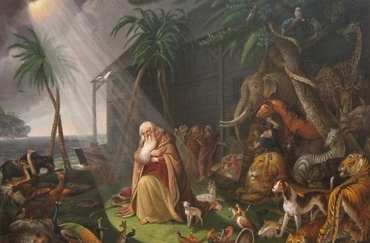1
I begynnelsen skapade Gud himmel och jord.
2
Och jorden var öde och tom, och mörker var över djupet, och Guds Ande svävade över vattnet.
3
Och Gud sade: »Varde ljus»; och det vart ljus.
4
Och Gud såg att ljuset var gott; och Gud skilde ljuset från mörkret.
5
Och Gud kallade ljuset dag, och mörkret kallade han natt. Och det vart afton, och det vart morgon, den första dagen.
6
Och Gud sade: »Varde mitt i vattnet ett fäste som skiljer vatten från vatten.»
7
Och Gud gjorde fästet, och skilde vattnet under fästet från vattnet ovan fästet; och det skedde så.
8
Och Gud kallade fästet himmel. Och det vart afton, och det vart morgon, den andra dagen.
9
Och Gud sade: »Samle sig det vatten som är under himmelen till en särskild plats, så att det torra bliver synligt.» Och det skedde så.
10
Och Gud kallade det torra jord, och vattensamlingen kallade han hav. Och Gud såg att det var gott.
11
Och Gud sade: »Frambringe jorden grönska, fröbärande örter och fruktträd, som efter sina arter bära frukt, vari de hava sitt frö, på jorden.» Och det skedde så;
12
jorden frambragte grönska, fröbärande örter, efter deras arter, och träd som efter sina arter buro frukt, vari de hade sitt frö. Och Gud såg att det var gott.
13
Och det vart afton, och det vart morgon, den tredje dagen.
14
Och Gud sade: »Varde på himmelens fäste ljus som skilja dagen från natten, och vare de till tecken och till att utmärka särskilda tider, dagar och år,
15
och vare de på himmelens fäste till ljus som lysa över jorden.» Och det skedde så;
16
Gud gjorde de två stora ljusen, det större ljuset till att råda över dagen, och det mindre ljuset till att råda över natten, så ock stjärnorna.
17
Och Gud satte dem på himmelens fäste till att lysa över jorden,
18
och till att råda över dagen och över natten, och till att skilja ljuset från mörkret. Och Gud såg att det var gott.
19
Och det vart afton, och det vart morgon, den fjärde dagen.
20
Och Gud sade: »Frambringe vattnet ett vimmel av levande varelser; flyge ock fåglar över jorden under himmelens fäste.»
21
Och Gud skapade de stora havsdjuren och hela det stim av levande varelser, som vattnet vimlar av, efter deras arter, så ock alla bevingade fåglar, efter deras arter. Och Gud såg att det var gott.
22
Och Gud välsignade dem och sade: »Varen fruktsamma och föröken eder, och uppfyllen vattnet i haven; föröke sig ock fåglarna på jorden.»
23
Och det vart afton, och det vart morgon, den femte dagen.
24
Och Gud sade: »Frambringe jorden levande varelser, efter deras arter, boskapsdjur och kräldjur och vilda djur, efter deras arter.» Och det skedde så;
25
Gud gjorde de vilda djuren, efter deras arter, och boskapsdjuren, efter deras arter, och alla kräldjur på marken, efter deras arter. Och Gud såg att det var gott.
26
Och Gud sade: »Låt oss göra människor till vår avbild, till att vara oss lika; och må de råda över fiskarna i havet och över fåglarna under himmelen och över boskapsdjuren och över hela jorden och över alla kräldjur som röra sig på jorden.»
27
Och Gud skapade människan till sin avbild, till Guds avbild skapade han henne, till man och kvinna skapade han dem.
28
Och Gud välsignade dem; Gud sade till dem: »Varen fruktsamma och föröken eder, och uppfyllen jorden och läggen den under eder; och råden över fiskarna i havet och över fåglarna under himmelen och över alla djur som röra sig på jorden.»
29
Och Gud sade: »Se, jag giver eder alla fröbärande örter på hela jorden och alla träd med fröbärande trädfrukt; detta skolen I hava till föda.
30
Men åt alla djur på jorden och åt alla fåglar under himmelen och åt allt som krälar på jorden, vad som i sig har en levande själ, åt dessa giver jag alla gröna örter till föda.» Och det skedde så.
31
Och Gud såg på allt som han hade gjort, och se, det var mycket gott. Och det vart afton, och det vart morgon, den sjätte dagen.







